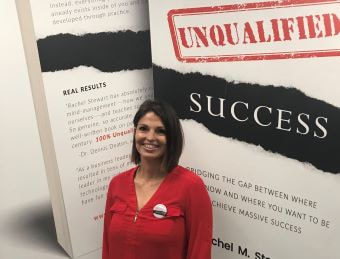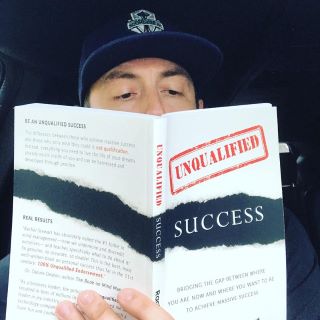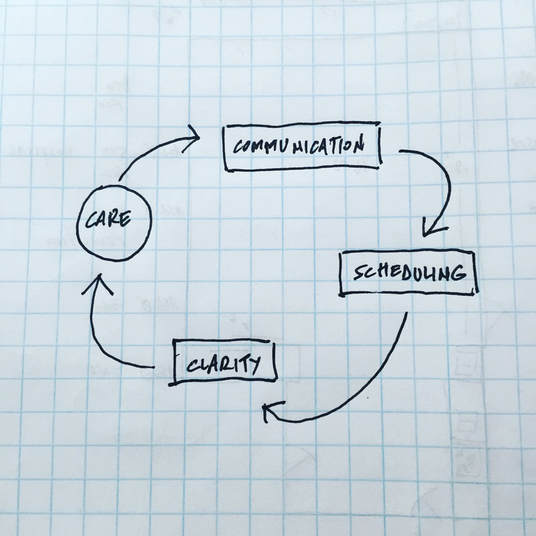Rachel Stewart has good news for all those who feel like they alone are unqualified to achieve their dreams, we all are. Rachel Stewart author of Unqualified Success Rachel Stewart author of Unqualified Success Positivity makes us feel good, but does it have any power? Author and practitioner Rachel Stewart shares her insights into harnessing the power of the right mindset while pursuing success. Her book, Unqualified Success, is packed with examples from high achievers as well as a uniquely personal story which unfolds throughout the narrative. Rachel provides practical tools for personal development that will empower readers to embrace the journey of bridging the gap from where you are today to where you want to be. Embracing RealityRachel makes herself approachable as an author. Introducing herself and kicking off the tone of the book with the first line, “I am unqualified to write this book.” By admitting this, she seeks to embrace this truth with those who feel as though they are unqualified and are willing to admit it as the start of their journey. The key is that, “The only qualification to get better: being willing to such when you start (p.180).” Starting at ZeroAt the time of writing this book, Rachel was serving as the Executive Vice President of Titan Restoration in Arizona. She started her career in the world of property damage restoration as a stay at home mother returning to the work force. Titan hired Rachel as an unqualified bookkeeper and office manager. As the company grew, so did Rachel and they found themselves reaching a five year goal in less than half that time. Check Your Ego at the DoorAt a critical point of choosing whether to merge with another company or continue on their own, Titan offers Rachel the opportunity to serve as their general manager. As the professional stakes grew the personal feelings of being unqualified did not diminish. It is in many of these uncomfortable moments of inadequacy that Rachel learns to lean into the reality of being unqualified rather than protecting your ego. “This book isn’t about ego. In fact, it’s about the exact opposite. I have been highly unqualified for every position that I have ever held. But I have come to learn that we all are. We are all unqualified today for the life we could have tomorrow (p.9).” From the TrenchesUnqualified Success weaves the stories of names we respect as achievers as well as new characters such as Magno Santos. Magno immigrates from Brazil and the reader is invited to journey with him throughout the book as he pursues the American Dream. Recognizing that we are all unqualified frees us to embrace the process of becoming by changing our perspective. Magno continually propels himself forward in the face of obstacles with the mantra, “If you can know it, I can know it (p.29).” Change of PerspectiveParadigm shift is easier said than done but by doing so we are able to see that our actions do not create out feelings, our thoughts do. Rachel posits that no one is qualified when it comes down to it. The big secret is, “That having the mindset that you are qualified is the biggest determining factor in whether or not you are qualified (p.25).” Cleaning out your thought closet and taking ownership of your thoughts is key to unlocking your potential. Change of Expectation Book Review for Unqualified Success Book Review for Unqualified Success If our self-view is the starting point, the next phase is aligning our expectation. “Too many times we are waiting to arrive before we start (p.48).” Understanding that mastery is a process and practice is the key to pursuit of perfection, we should not discourage ourselves with a defined view of the end. Our battle for becoming is primarily an internal one. The imagery of the two wolves fighting inside each of us presented in Chapter 5 is apt. Which one will win? “The one you feed (p.68).” Change of EnvironmentOrdinary people achieve extraordinary things. Greatness is not the exclusive property of the elite. “The willingness to stay in discomfort for extended periods of time is the essence of grit. It also happens to be an essential key to achieving everything you want (p.83).” As Rachel notes, discomfort is a factor both in failure and in success. Discomfort is the currency and working through it is the journey. When we are tested we must resist our numbing agents and lean into the process of testing our limits. The Big RevealRachel blends a beautiful mix of personal experience, representative stories and practical tools to assist the reader in building a resource base for feeding their growth mindset. She seeks to inspire others to embrace the journey. The book reveals that Magno’s relentless pursuit of bettering himself intersects with Rachel’s family in a very real way when is quality of care lead to an early diagnosis for her father. “Nobody starts out extraordinary. No one begins fully qualified and ready. The minute we understand this principle and it really sinks in, our whole work opens up (p.243).” Are You Ready to be an Unqualified Success?If you dare to read this book, you will find that your excuses melt and your obstacles become opportunities. You should feel unqualified but that should in no way stop you from pursing success. “When we are willing to trade in our need to win or succeed for a need to simply learn and grown instead, we open another world of possibility for achievement (p.186).” You are not alone, you have resources and a tribe of fellow unqualified successes rooting for you.
1 Comment
It’s the end of the year. We feel the pressure to make our resolutions. What should we consider when drafting plans to grow ourselves and our business in the coming year? Math may or may not be your strong suit, but planning and success are measurable points upon an X and Y axis. 1. I didn’t have a plan and I didn’t reach my goals I didn’t have a plan. I was not able to achieve my goals. This may or may not be the result of not having a plan. For the coming year we would have nothing to lose by drafting and implementing a plan. The bar was set low last year and we knocked it over. This year it’s time to give setting the bar a chance, unless we want to continue in mediocrity. Did you have a plan but you just don’t want to admit that you failed? There is something to stating your goals aloud or at least in writing. If you want to increase your achievement potential you may find some value in our video on personal organization. 2. I didn’t have a plan and I reached my goals I didn’t have a plan. I was able to achieve my goals. As noted before, perhaps you did have a plan but you didn’t want to state it for the record just in case you didn’t reach your marks. Many are afraid of failure, but it is also common to be afraid of success. Don’t allow yourself to fail in planning simply because you are afraid to fail. If you are experiencing fear of failure you may find some value in our fear mantra. You can take a gamble on not having a plan and being able to reach your goals in the coming year. Or you can take the momentum you had from last year and improve that through composing and declaring your plans for the coming year. 3. I had a plan and I didn’t reach my goals I had a plan. I was not able to achieve my goals. This may or may not have been the result of having a plan. Was the issue with the plan, the execution or a failure to adapt? Having a plan does not mean that we can guarantee our results. We like to practice rigid flexibility. We want to have a plan but we must be able to adapt as we receive new information or experience obstacles. If you crave success you will need to prepare to succeed. If you want to take yourself to the next level in your personal and professional development, it’s time to make a plan for how you are going to use the hours that you have — make a plan for what you will do with the hours everyone else is wasting. 4. I had a plan and I reached my goals I had a plan. I was able to achieve my goals. Take a little victory dance. You did it. You were intentional about your approach to last year. You were able to execute your plan, adapt in the face of obstacles and persevere to the end of the year. Now that you have tasted success, can you repeat it? It is likely that the same exact plan executed in the same exact way will not bring the same result. The only constant is that things are constantly changing. The good news is that you now have a habit for success and you have tasted the glory of it. This should provide you with a template as well as the motivation to repeat your efforts from last year and carry them into the new one. Whether you planned and/or succeeded, this is a new year and a fresh new opportunity to chase life, liberty and the pursuit of happiness. In drafting your plan, consider the following: 1. Is your vision clear for the coming year? 2. Are your goals rooted in your mission? 3. Are there habits that need to be eliminated? 4. Are there parts of your system that can be simplified? 5. Do you need to adjust your structure? When we invest in creating an end of year plan, we help to clarify and solidify our vision. If vision is tied to reality than it should filter through our personal and organizational disciplines. Vision fuels our habits. Vision combined with goals will clarify our mission. Whether we want to grow or not, growth is essential. Whether we think we need change or not, adaptation is the root of survival. Failure is not final and neither is success. Whether last year was one of achievement or disappointment this is a fresh new year and we can change things or build on our momentum through the simple act of planning. Prepare yourself to succeed. Success tomorrow starts with making a plan today. IZ Ventures - business coaching & consulting. We don’t just consult - we help you Connect, Collaborate & Conquer. Simple tools and practical insights for personal organization, scheduling and project management. Part 1 focuses on tips and tools for personal organization. Part 2 will address setting up a foundation for team organization. "Success tomorrow starts with making a plan today." Simple tools for personal organization, aka daily success, aka scheduling include:
1) a notebook 2) a pen 3) a computer with simple programs such as Google calendar 4) a phone with a task list or calendar (sync with computer) Making a daily plan should be a habit that helps you to set yourself up each day for success in the upcoming days activities. 1) make your handwriting legible 2) start with the date and think through your day 3) organize your tasks in relationship to importance 4) by keeping structure to your daily outline you can add notes (make sure they are legible) 5) update your task list as you accomplish items as well as when you add them 6) carry over unfinished tasks to the following day 7) make it a habit to set you list the day before, to update at intervals during the day as well as when new assignments come up Personal organization is a recipe for success. Success tomorrow starts with making a plan today. These simple habits are key to to clarify your activities according to your mission, to schedule for mission momentum and keep yourself accountable to following through. Dysfunction is easy. Writing sloppily, not keeping items in order and failing to follow through are all set backs that could lead to disaster. Stay on top of yourself - or as we say, "Don't get behind, that's where the farts are (read more HERE)." Clarity. Consistency. Accountability. For more information, tips and videos check out our webpage - http://www.izvents.com/words/category...  Scheduling is part of clarity, consistency & accountability. Scheduling is part of clarity, consistency & accountability. Winning habits aren't always the most complex. Enhance clarity to build consistency and establish accountability through the simple discipline of scheduling. Scheduling is the process of having a plan, or at least attempting to tell you day how you think it should go. Writing down your goals is important to do on the macro level of having a life plan, on the annual level of mapping out your course and on the micro level of having a daily road map. There is something special that happens when we take the time to write things down, there is some connection between the engagement of the brain and the enabling of the will that is connected to committing something to your calendar. Read more on the stories of successful people who are in the habit of writing down their goals, HERE. Scheduling yourself the day prior or early in the morning enables you to be ahead of your day before the chaos hits and the day takes on a mind of it’s own. If you don't schedule ahead, you will always be playing from behind. You never want to get behind, as we all know - that's where the farts are. Whether you schedule in blocks of time or are down to the minute, prioritization (more) starts with having a target. Real Estate mogul and Shark Tank star, Barbara Cocoran, swears by her daily to-do list which she hand writes every night, prioritizes with a simple rating system and emails to her personal assistant for accountability. In an interview with Inc. Magazine Barbara outlines her process, “I rate the items in order of importance: A, B, or C. The A's are where the gold is. These are the things that will move my business ahead and make me money. I find there are really only three to five A items on any given day, and I do those first.” Goal setting is a muscle that must be worked out on the daily, it requires mental strength, it will test your will power and it is enhanced by accountability from others. Setting aside time in your day to prepare yourself can be as simple as the habit of writing down your schedule. Organization in this way becomes a powerful habit that will help you to make gains on the items that are important to you. Like budgeting for your finances, a good plan will assist you to spend your time (which is impossible to recoup) where it is needed rather than be in a vicious cycle of questioning where the time went at the end of your day. Making your schedule visible to yourself and your team members creates a level of accountability as well as demonstrates leadership by example (more). Vince Lombardi has a great saying, “The will to win is not nearly so important as the will to prepare to win.” Who doesn’t want to win? Yet the thing that separates those who achieve success from those who talk about it is found in the preparation that winners put in. Those hours of discipline do not happen by accident, they come with a commitment to schedule in time for the things that are important, to prioritize and to persevere through the pain. Organization can be painful or just plain overlooked by many, but a successful system does not have to be complex to be effective. In terms of property restoration every production manager knows that our schedules have to be constructed with a certain amount of flexibility in them for those inevitable calls for emergency services from water or fire related damages. Drafting a schedule the day prior and making the plan visible for the team (more) are key to communicating that leadership respects the team and is committed to helping them to be prepared for the upcoming needs of our clients. Scheduling is a core communication component that shows our employees we care about them and creates a visible game plan through which we are able to communicate effectively with our clients as well (more). The discipline of scheduling your self should carry into the care of scheduling the team and the courtesy of communicating those schedules to our clients. The will to prepare to win starts with personal habits that translate into organizational systems that guide our core professional services. Being organized forces us to care about and budget our time. Scheduling generates habits that position us to pursue our goals with clarity, consistency and accountability. Simple things can be the difference between long term success (more) and cycles of chaos. Organizational truth: Don’t get behind, that’s where the farts are. References: More from Barbara Cocoran in her interview with Inc. Magazine, including video - https://www.inc.com/magazine/201704/anna-hensel/day-in-the-life-barbara-corcoran.html |
AuthorThoughts on personal and professional development. Jon Isaacson, The Intentional Restorer, is a contractor, author, and host of The DYOJO Podcast. The goal of The DYOJO is to help growth-minded restoration professionals shorten their DANG learning curve for personal and professional development. You can watch The DYOJO Podcast on YouTube on Thursdays or listen on your favorite podcast platform.
Archives
March 2023
Categories
All
<script type="text/javascript" src="//downloads.mailchimp.com/js/signup-forms/popup/unique-methods/embed.js" data-dojo-config="usePlainJson: true, isDebug: false"></script><script type="text/javascript">window.dojoRequire(["mojo/signup-forms/Loader"], function(L) { L.start({"baseUrl":"mc.us5.list-manage.com","uuid":"b9016446bd3c6a9f0bd835d4e","lid":"83282ffb9e","uniqueMethods":true}) })</script>
|
Jon Isaacson |
Connect. Collaborate. Conquer.
© COPYRIGHT 2015. ALL RIGHTS RESERVED.
|



 RSS Feed
RSS Feed